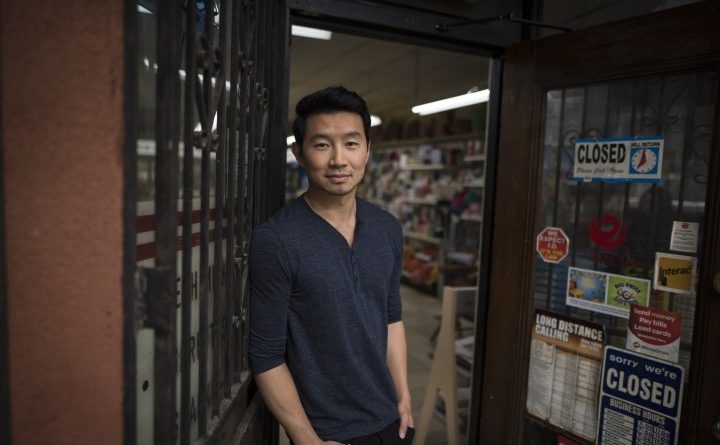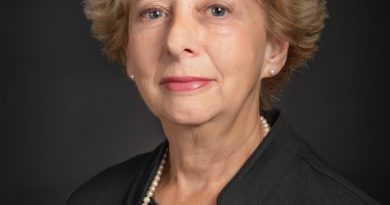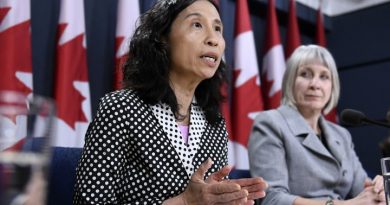‘Kim’s Convenience’ will ‘always be home,’ says new Marvel star Simu Liu
TORONTO — No matter what his Marvel future holds, Simu Liu says “Kim’s Convenience” will always be home for him.
In July, the cast member from the hit CBC comedy series made international headlines when he was announced as Marvel’s first big-screen Asian-American superhero in the upcoming “Shang-Chi and the Legend of the Ten Rings.”
But despite his new superstar status, he said he has “every intention of coming back” if there is a fifth season for the Toronto-shot show, which returns for a fourth season on Tuesday.
“This place will always be home — the city of Toronto and even just the store,” Liu said in an interview at the end of July on the set of “Kim’s Convenience,” about a Korean-Canadian family and its Toronto store.
“There’s such a comfort and I’ve grown to love this store…. And without ‘Kim’s Convenience,’ there’s no way that I’m here today. They’ve given me an incredible opportunity to hone my comic skills and comedic timing over the four seasons that I’ve been here. And it’s never felt like a day of work.”
“Kim’s Convenience” stars Liu as Jung, son of patriarch Appa and matriarch Umma, played by Paul Sun-Hyung Lee and Jean Yoon respectively. Andrea Bang plays daughter Janet.
Liu praised the support he’s received from the cast and producers about his Shang-Chi role, noting everyone is “committed to making this work” should the show be renewed while he’s training and shooting the film in Australia.
“I know Marvel is a lot to deal with, and obviously the shooting schedule would be very, very strenuous,” said Liu, who immigrated to Canada from northern China at age five and grew up in Etobicoke and Mississauga, Ont.
“But I’m keeping my fingers crossed, we’re all keeping our fingers crossed, that season 5 will work.”
Based on the hit Canadian play by Ins Choi, “Kim’s Convenience” has earned a global following since its debut in October 2016, with a presence on Netflix and profiles in major publications.
“This character has been a tremendous boon for me,” said Calgary-raised Lee, who also starred in the stage version and has won two Canadian Screen Awards for playing Appa.
“It’s made my career. Growing up, I never wanted to be Korean. I always pushed that part of me away, because as an immigrant kid, you stick out and you want to fit in…. I didn’t want to learn Korean, I didn’t want to eat Korean food, I didn’t want to go to Korean school, none of that stuff, which drove my parents crazy.
“And I think it’s ironic, in a delicious kind of way, that the biggest advancement in my career, the biggest blessings have come from embracing that part of my heritage that I’ve tried to deny.”
Yoon said the representation on the series “ensures that there are a lot of kids who are not going to feel that way about themselves — whether it’s about their Korean culture or whatever other culture that they have.”
“Just putting an immigrant family at the centre of a show, set in Toronto, as diverse and as dynamic as our city is, I think makes a big difference, just in terms of shifting the norm.”
Like previous seasons, the new batch of episodes touch on some timely social matters.
In Tuesday’s premiere, Appa serves a customer who identifies as gender-neutral and learns there are different pronouns for non-cisgender people. The episode also explores the issue of people imitating each other’s accents.
“It’s lovely to use comedy as an in, because the best comedy is never punching down, it’s never making fun of somebody,” said Lee.
“For me, at least, the best comedy is observational comedy without judgment, but is just sort of like, ‘Hey, you ever notice this is what’s going on?’ And we try to walk that line with ‘Kim’s’ as well. Now, we don’t purport to give answers but what we want to do is start conversations.”
Yoon praised the writers for presenting certain subjects in a way that defuses the anxiety surrounding them.
“I think anxiety and fear is what can seed miscommunication, and just popping it open is a relief for everybody,” she said.
“It doesn’t matter who you are — everybody has an area where they’re not sure, where they’re uncertain, where things are changing. It’s satisfying to see that kind of discourse in network television.”
By: Victoria Ahearn.
© The Canadian Press, 2020. All rights reserved. This material may not be published, broadcast, rewritten or redistributed.




